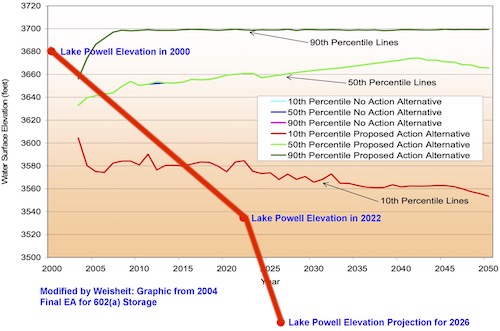
| ABOUT | ARTICLES | FORUM | RESOURCES | GALLERY | CROSS |
 |
|
|||||||||||||
|
||||||||||||||
|
Talk about this article... Reclamation announces a public opportunity: prepare prescoping comments to develop new operating criteria for the Colorado River Basin June 23, 2022  The thick red line reflects the last 22-years (actual) and then Reclamation's projection to 2026 The Comment Period for Prescoping is now closed. COMMENT LETTERS
Note: The list below also includes comment letters specific to the Drought Response Operations Agreement (DROA) and since July of 2022. See: 1990 - Agency Recalcitrance and Evasion Regarding Compliance with the National Environmental Policy Act Relating to Glen Canyon Dam Operations: A Documented Need for Congressional Intervention. Lippman.
There are many more and they will be posted soon. ### PRESCOPING COMMENT PERIOD
Submit electronically to: CRB-info@usbr.gov Questions can be addressed to: ### Reclamation's press release is HERE & archived here For Release: June 23, 2022Peter South <psoeth@usbr.gov> 303.445.3615 eMail: Peter Soeth ### NEWS ABOUT PRESCOPING A MUST READ: June 24, 2022 - By Lexi Peery for KUER: Feds call for public input on how to manage the strained Colorado River. A justified public position to improve the management of the Colorado River Basin would include the ask that the seven governor's terminate the employment of water managers who are: (1) skeptical of the value of participation from voters, taxpayers and ratepayers; 2) managers who blame the other states for their water shortage problems. The replacements should be the young people who represent the new families of a compromised nation. The formative failures of the Colorado River Compact from the seven states include: (1) the negotiated compromise to split this river basin into two divisions was the first big mistake, because it embedded competition rather than cooperation; (2) instituting inflated water allocations was the second big mistake, because it embedded misinformation and exaggerations; (3) not deducting evaporation and seepage losses at the points of diversion was the third big mistake, because it embedded overconsumption; (4) delaying and excluding negotiations with the sovereign tribes and Mexico was the fourth mistake, because it embedded inequity; (5) the inability to self-correct these problems has become demoralizing, because it created misleading distractions and false starts that waste time and resources. The 2022 Federal Register Notice is archived HERE
The 2007 Record of Decision is archived HERE
July, 2021 - our preparations for this federal announcement:
Sample Comment Letters archived on OTC
HELPFUL WEBSITES
Prescoping Comments are due: September 1, 2022 (10 weeks) ### Reclamation's press release is HERE (archived) For Release: June 23, 2022 eMail: Peter SoethPeter South <psoeth@usbr.gov> 303.445.3615 Reclamation welcomes public input on development of future Colorado River operations during historic drought. Federal Register notice seeks comment on meaningful participation ideas and operational strategies to consider when updating key reservoir and water management decisions and agreements WASHINGTON – The Bureau of Reclamation today published a Federal Register notice to assist in its efforts to develop future Colorado River operating provisions. Several decisional documents and agreements that govern the operation of crucial Colorado River facilities, Lake Powell and Lake Mead, and the management of Colorado River water will expire at the end of 2026. The notice seeks specific input on how to foster meaningful participation by all stakeholders in preparation for beginning the National Environmental Policy Act process to develop post-2026 operating approaches for the Colorado River, and operating strategies to address post-2026. "In my testimony last week, I stressed the need for a quick response and action from across the basin to reduce water use and protect the sustainability of the Colorado River system," said Commissioner Camille Calimlim Touton. "As we focus on these short-term response actions, we also clearly recognize the importance of simultaneously planning for the longer-term to stabilize our reservoirs before we face an even larger crisis." The publication of this notice is not the start of the NEPA process but is a tool to seek input and encourage brainstorming and input before the formal initiation of the NEPA process. Reclamation is targeting an early 2023 start for the NEPA process to develop post-2026 operating guidelines. "We want to hear from everyone who has a stake in this basin. We intend to develop our next operating rules in an inclusive, transparent manner, relying on the best available science," said Senior Water Resources Program Manager Carly Jerla. “We’re seeking input to foster a meaningful participation of Colorado River partners and stakeholders and to gather ideas and strategies for the post-2026 operations that should also be considered in the NEPA process." The notice asks for specific suggestions on the process and the substance of how best to analyze future operations and what those operations should include. It also highlights the changing circumstances in the Colorado River Basin since 2007, including declining hydrology, drought and low-runoff conditions impacted by a warmer, changing climate, inclusivity in Colorado River decision-making and the need for continued operational alignment and partnership with the Republic of Mexico. Specific documents and agreements that expire at the end of 2026 include the December 2007 Colorado River Interim Guidelines for Lower Basin Shortages and Coordinated Operations for Lake Powell and Lake Mead, among other essential management documents, both within the United States as well as international agreements between the United States and Mexico under the 1944 Water Treaty. While continuing to work with its partners to mitigate the impacts of this 22-year drought, Reclamation is focused on the next phase of Colorado River operational decision-making. To help explain the process and answer questions, Reclamation is hosting two webinars: WEBINARS FOR THE PUBLIC
July 12, 2022 @ 10:00 am (Mountain) July 14, 2022 @ 10:00 am (Mountain) The public input period ends September 1, 2022. Prescoping for new operational guidelines
Talk about this article... |
| ||||